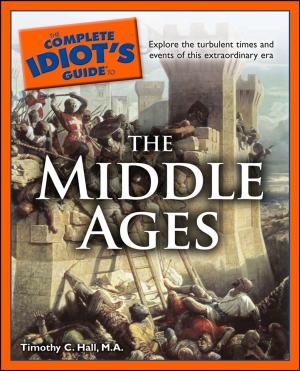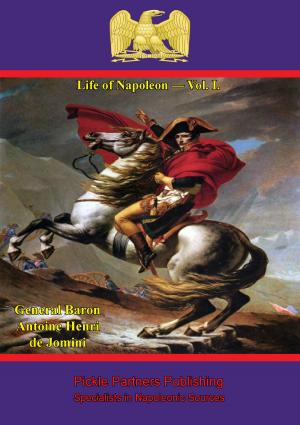Mr. Punch's History of Modern England Vol. III—1874-1892 (of 4 ) (Illustrations)
Nonfiction, History, European General, British, Military| Author: | Charles Larcom Graves | ISBN: | 1230000282509 |
| Publisher: | CASSELL AND COMPANY, LTD | Publication: | November 25, 2014 |
| Imprint: | Language: | English |
| Author: | Charles Larcom Graves |
| ISBN: | 1230000282509 |
| Publisher: | CASSELL AND COMPANY, LTD |
| Publication: | November 25, 2014 |
| Imprint: | |
| Language: | English |
Example in this ebook
PART I
THE NATIONAL OUTLOOK
HIGH POLITICS
The pageant of the Victorian age reached its grand climacteric in the period on which we now enter. As a "drum and trumpet chronicle" the history of the eighteen years from 1874 to 1892 was void of any British military operations on the grand scale. Of the names Kandahar, Maiwand, Isandhlwana, Majuba, Khartoum and Tel-el-Kebir only the first and last minister to our complacency. Yet the achievements of Lord Roberts in the two Afghan campaigns were splendid examples of bold leadership and British endurance, and Lord Wolseley's suppression of the revolt of Arabi was more than efficient. In the mid 'seventies Germany came perilously near forcing a fresh war on France; but the influence of the British Crown and Government was largely instrumental in averting the calamity. We were twice on the verge of war with Russia in 1878, first in April after the Treaty of San Stefano at the close of the Russo-Turkish war, and second in July over Russia's intervention in Afghanistan. The country was divided, for while there had been a revival of the old distrust of Russia, Gladstone had thrown the whole weight of his influence into the campaign of protest against the "Bulgarian atrocities." The Government, on the whole, steered a middle course between the "Jingoes" and those who supported Gladstone's "bag and baggage" policy towards the Turks. At the height of the Tory Press campaign against Russia, Lord Salisbury, in a speech in the City, observed: "It has been generally acknowledged to be madness to go to war for an idea, but it is yet more unsatisfactory to go to war against a nightmare." Punch, who was never pro-Russian, but at the moment was strongly anti-Turk, interpreted this saying as a caution against Jingo scaremongering.
In one of the earliest of his cartoons on the possibility of war over the Eastern question, he represented Disraeli standing on the edge of a precipice with Britannia, asking her to move "just a leetle nearer." Britannia declines to move one inch farther, adding, "I'm a good deal nearer than is pleasant already." But four months later, in May, 1878, when he showed Britannia between two advisers, Disraeli and Bright—the former wearing a sword camouflaged with an olive wreath—Punch supported neither, but applauded the third Voice, that of Neutrality. Professorial intervention he resented strongly; and severely rebuked Freeman, the historian, for a violent and unpatriotic speech. In fine, he was equally down on the blatant bunkum of the music-halls and the ill-considered agitation of fussy Pacificists; on War-Donkeys and Peace-Donkeys; "Asses are asses, whether bound in Lion or in Calf."
But if in Europe Great Britain never got beyond the stage of naval demonstrations and the summoning of troops from India, these eighteen years were not devoid of great as well as spectacular events. They opened with the triumphant return to power of Disraeli, admirably symbolized in Tenniel's great cartoon of the chariot driver and his fallen rival, and with his efforts to translate into practical politics his grandiose doctrines of Imperialism. He made the Queen Empress of India, he riveted our hold on the Suez Canal by the opportune purchase of the Khedive's shares in 1875; he claimed to have brought back "Peace with Honour" from the Berlin Congress of 1878, the year which marked the zenith of his power and the beginning of its decline. The twelve years that followed Gladstone's success at the polls in 1880 were crowded with momentous events; the rise and ferment of the new nationalities abroad; the advent of new champions and gladiators in the political arena at home—Parnell and Randolph Churchill and Chamberlain.
To be continue in this ebook
Example in this ebook
PART I
THE NATIONAL OUTLOOK
HIGH POLITICS
The pageant of the Victorian age reached its grand climacteric in the period on which we now enter. As a "drum and trumpet chronicle" the history of the eighteen years from 1874 to 1892 was void of any British military operations on the grand scale. Of the names Kandahar, Maiwand, Isandhlwana, Majuba, Khartoum and Tel-el-Kebir only the first and last minister to our complacency. Yet the achievements of Lord Roberts in the two Afghan campaigns were splendid examples of bold leadership and British endurance, and Lord Wolseley's suppression of the revolt of Arabi was more than efficient. In the mid 'seventies Germany came perilously near forcing a fresh war on France; but the influence of the British Crown and Government was largely instrumental in averting the calamity. We were twice on the verge of war with Russia in 1878, first in April after the Treaty of San Stefano at the close of the Russo-Turkish war, and second in July over Russia's intervention in Afghanistan. The country was divided, for while there had been a revival of the old distrust of Russia, Gladstone had thrown the whole weight of his influence into the campaign of protest against the "Bulgarian atrocities." The Government, on the whole, steered a middle course between the "Jingoes" and those who supported Gladstone's "bag and baggage" policy towards the Turks. At the height of the Tory Press campaign against Russia, Lord Salisbury, in a speech in the City, observed: "It has been generally acknowledged to be madness to go to war for an idea, but it is yet more unsatisfactory to go to war against a nightmare." Punch, who was never pro-Russian, but at the moment was strongly anti-Turk, interpreted this saying as a caution against Jingo scaremongering.
In one of the earliest of his cartoons on the possibility of war over the Eastern question, he represented Disraeli standing on the edge of a precipice with Britannia, asking her to move "just a leetle nearer." Britannia declines to move one inch farther, adding, "I'm a good deal nearer than is pleasant already." But four months later, in May, 1878, when he showed Britannia between two advisers, Disraeli and Bright—the former wearing a sword camouflaged with an olive wreath—Punch supported neither, but applauded the third Voice, that of Neutrality. Professorial intervention he resented strongly; and severely rebuked Freeman, the historian, for a violent and unpatriotic speech. In fine, he was equally down on the blatant bunkum of the music-halls and the ill-considered agitation of fussy Pacificists; on War-Donkeys and Peace-Donkeys; "Asses are asses, whether bound in Lion or in Calf."
But if in Europe Great Britain never got beyond the stage of naval demonstrations and the summoning of troops from India, these eighteen years were not devoid of great as well as spectacular events. They opened with the triumphant return to power of Disraeli, admirably symbolized in Tenniel's great cartoon of the chariot driver and his fallen rival, and with his efforts to translate into practical politics his grandiose doctrines of Imperialism. He made the Queen Empress of India, he riveted our hold on the Suez Canal by the opportune purchase of the Khedive's shares in 1875; he claimed to have brought back "Peace with Honour" from the Berlin Congress of 1878, the year which marked the zenith of his power and the beginning of its decline. The twelve years that followed Gladstone's success at the polls in 1880 were crowded with momentous events; the rise and ferment of the new nationalities abroad; the advent of new champions and gladiators in the political arena at home—Parnell and Randolph Churchill and Chamberlain.
To be continue in this ebook















